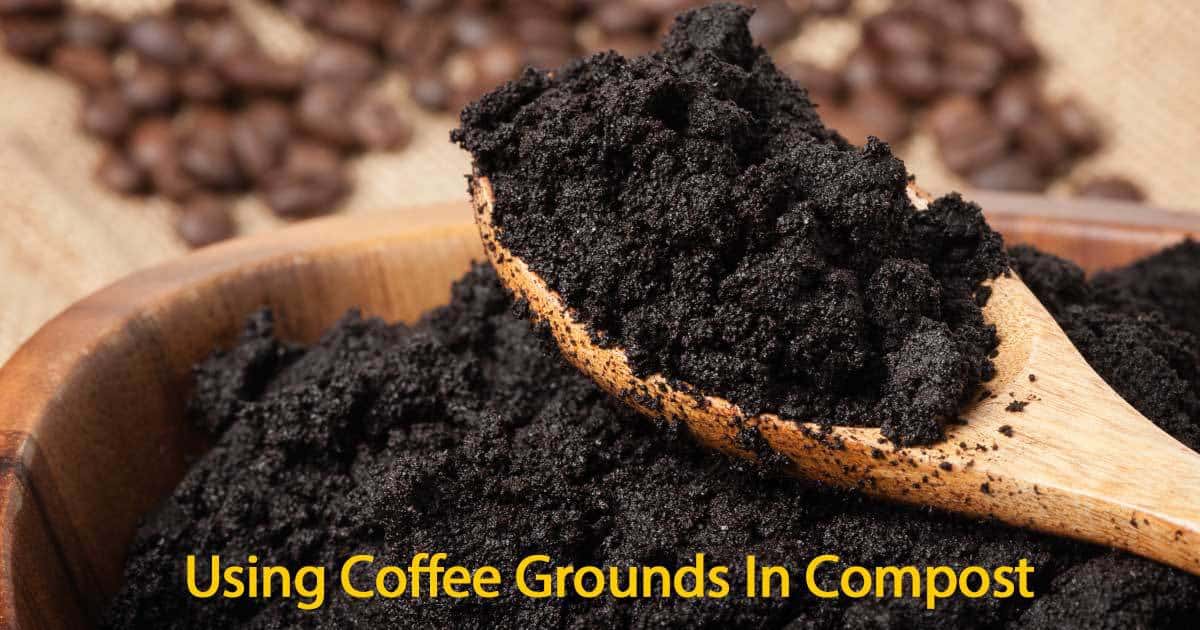Adding the coffee grounds in compost from your daily cup of java is a wonderful eco-friendly way to build a nutrient-rich compost soil. A compost that also includes yard waste and kitchen scraps like fruits and vegetables as they break down.









https://plantcaretoday.com/coffee-grounds-in-compost.html
Adding coffee grounds in compost is an excellent choice as use coffee is rich in nitrogen. With a carbon to nitrogen ratio of 20:1.
Nitrogen, along with phosphorus and potassium, are the main nutrients in any successful fertilizer. The main role of nitrogen in plants is to allow them to convert sunlight into energy.

Compost can be the greatest gift for plants. It replenishes the nutrients taken from the soil. Along with kitchen wastes, green organic matter, and animal manure, adding coffee grounds to a compost pile can be a great help and soil builder.
How To Use Coffee Grounds In Compost:
Add paper coffee filters (tear them apart for quicker composting) and grounds to your compost to help as a soil builder. The grounds acts as an alternative to the green organic material as it is rich in nitrogen. However, remember coffee grinds are not a nitrogen fertilizer.
The spent coffee grounds, brown in color, help to create a rich environment for the micro-organism living in the compost soil.
These microorganisms help break down the organic wastes turning them into nutrient-rich matter. Add them to the compost bin by layering:
- 1/3 fresh grass clippings
- 1/3 leaves
- 1/3 coffee grounds
Coffee grounds can also be added to worm bins. When combined with other household wastes, coffee grounds help create a good compost soil in a vermicompost bin, the compost made with the help red worms.
Spread coffee grounds on top of the soil and cultivate them into the soil. Another option is to spread them on the soil as a mulch and cover with compost, leaves or bark mulch.
Coffee grounds can be used to create slug barriers in the garden and shield plants that are susceptible to slug attacks. You can spread them around your lingularias, hostas, and other plants that are normally attacked by slugs.
Make sure to use caffeinated coffee as it is the caffeine that kills and deter slugs. Simply spread the coffee grounds to a height of 0.5-1 inch around the susceptible plant. Restock as necessary.
Chemical Composition in Coffee Grounds
Not everything contained in the coffee beans makes it to the refined coffee you consume in the morning. Nitrogen-rich proteins needed for plant growth comprise over ten percent of coffee grounds.
Since coffee is extracted in water, most of the oils, fatty acids, lipids, and triglycerides remain in the grounds.
Decomposition of Coffee Grounds in Compost
After several months, fungi and specialized bacteria break down the components of coffee grounds. Larger consumers such as earthworms are also able to use the chemical components of the coffee grounds.
Pushing the grounds deep into the soil, helps earthworms work as soil builders to improve the soil structure such as increased aggregation.
Shop Related Products

$7.49

$8.99

$11.18$11.43

$38.11$44.05

$11.18$12.30

$14.99$19.99

$19.99

$82.98$95.99
When fully decomposed, coffee grinds increase the pH of the compost soil, but the acidity doesn’t last for long.
Effects of Coffee Grounds on Plant Growth
Coffee grounds are ideal for cultivating mushrooms, because of their antimicrobial activity. Coffee ground mulches and composts enhance the germination of sugar beet seed and also improve the growth and yield of soybeans and cabbage.
“Coffee grounds encourage the growth of microorganisms in the soil, which use nitrogen for their growth and reproduction. While the grounds are being broken down by the microorganisms the additional nitrogen in the fertilizer will provide a source of nutrients for your plants. source: OSU”
The high level of nitrogen in coffee grounds, as well as their mulching benefits such as increasing moisture in soil and moderating soil temperature, makes them ideal for almost all the plants.
However, it inhibits germination and growth of several plants such as alfalfa and red and white clovers seed. They also inhibit the growth of Chinese mustard and Italian ryegrass.
What Is The Ideal Amount Of Coffee Grounds In Compost?
Though there is no optimal scientific recommendation for the amount of coffee grinds you should add to compost. However, on average a 10 to 20% of the total compost can be made up of coffee grounds. Over 30 % is considered detrimental.
Therefore, using no more than 20 percent by volume of the coffee filters and grounds in compost will ensure a diversity of macro-organism and microorganism. Remember, coffee grounds do not go bad, store them in a 32 gallon plastic trash can near your compost bin.
By using the above ratio of coffee grounds to compost materials, your soil pH should not rise to alarming acidic levels.
For further information lof on website :https://plantcaretoday.com/coffee-grounds-in-compost.html





No comments:
Post a Comment